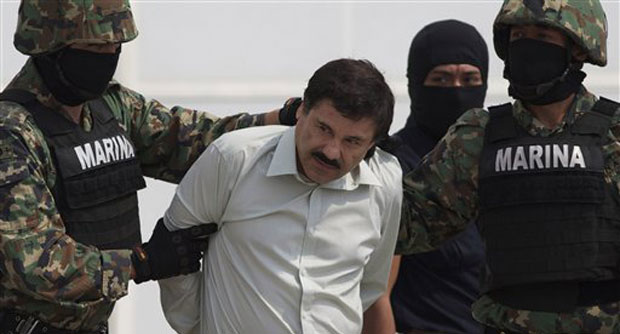Mexico makes clear it will hold on to ‘El Chapo’

In this Saturday, Feb. 22, 2014 photo, Joaquin “El Chapo” Guzman is escorted to a helicopter in handcuffs by Mexican navy marines at a navy hanger in Mexico City, Mexico. Guzman, the head of Mexico’s Sinaloa Cartel, was captured overnight in the beach resort town of Mazatlan. AP
MEXICO CITY, Mexico—Mexico made clear Tuesday it is determined to keep Joaquin “El Chapo” Guzman in its highest-security prison for the foreseeable future, putting off United States extradition in a move that could bolster President Enrique Pena Nieto’s nationalist credentials but also shine a spotlight on the country’s woeful judicial system.
Experts say Pena Nieto’s administration and those of his predecessors have proven unable to match headline-grabbing arrests like Guzman’s with complex, long-term investigations and prosecutions of deep-rooted criminal networks. Cases have stalled and cartels have continued to operate. Last year, one of Guzman’s closest allies walked out of the prison where the U.S. said he was running drugs from behind bars.
The Mexican government says there is no way Guzman will repeat the 2001 escape that let him roam western Mexico for 13 years as he moved billions of dollars of cocaine, methamphetamine and heroin around the world. Authorities here say they want to be the first to interrogate Guzman, and use the information to dismantle his Sinaloa cartel, a multibillion-dollar enterprise that dominates drug trafficking in much of Mexico and stretches into 54 countries.
Two federal judges ruled Tuesday that Guzman will have to stand trial on separate drug-trafficking and organized-crime charges in Mexico. And the Pena Nieto administration said the man widely considered the world’s most-powerful drug lord until his capture Saturday will face at least six other pending criminal cases before it even considers extraditing him to the U.S.
“I don’t think it’s going to happen anytime soon,” Attorney General Jesus Murillo Karam said in a radio interview. “This is the start of a full investigation that will allow us to fully eradicate his organization. It would be pointless to do anything else.”
Article continues after this advertisementBut experts on both sides of the border warned that keeping Guzman in Mexican hands could squander the opportunity to exploit his unparalleled knowledge of the country’s biggest drug cartel. U.S. prosecutors have proven far more capable of offering captured drug lords the incentives to cooperate with law enforcement, experts said.
Article continues after this advertisementU.S. officials routinely use family members as tools to pressure defendants into giving up information, granting visas to relatives of cooperative prisoners while threatening to leave loved ones penniless by freezing assets of drug lords who refuse to play ball.
Mexican authorities arrested Guzman, 56, along with his 20-something former beauty-queen wife and twin toddlers, but let her go because there were no charges pending against her. Observers called it a staggering missed opportunity that wouldn’t have occurred in the U.S.
“The U.S. attorneys have many tools. They’re pretty good at flipping people. They can offer far more things than the Mexican authorities can offer,” said Alejandro Hope, a security analyst and former official in Mexico’s domestic intelligence service. “Right now the challenge is just to keep him in prison. That would be success enough. I don’t think he’s going to provide too much information.”
One of Guzman’s closest allies and mentors, Rafael Caro Quintero, walked out of a federal prison in August after a procedural ruling that cut 12 years off a 40-year sentence for killings that included the murder of U.S. Drug Enforcement Administration agent Enrique “Kiki” Camarena. A three-judge federal appeals court in the western state of Jalisco found that he should have been tried in state, not federal, court, and vacated his sentence in a ruling widely seen by Mexican and U.S. officials as inexplicable and likely corrupt.
Months earlier, the U.S. Treasury Department blacklisted more than two dozen people and companies that belonged to what it called a drug-running and money-laundering network that Caro Quintero ran years from behind bars.
A U.S. law enforcement official familiar with the investigation said Caro Quintero, who has not reappeared in public since his release, was passing orders through prison phone calls as well as lawyers and family members who visited him, even as he was shifted between at least three Mexican prisons.
U.S. investigations found a number of upper-tier traffickers have been similarly able to run cartels from behind bars.
“For someone as powerful as Caro Quintero was, and is, it was certainly true,” said the U.S. official, who agreed to discuss the matter only on condition of anonymity because he wasn’t authorized to speak publicly. “Even without telephone communications you can transmit a lot of instructions that then are followed.”
David Weinstein, a former assistant U.S. attorney in Miami, said the biggest concern in keeping Guzman in a Mexican prison will be his ability to continue running his global drug empire.
“It could be argued that he would be doing the same thing from a jail, and just bide his time,” said Weinstein who previously ran the narcotics section in Miami.
Weinstein said Guzman almost certainly had some help from various corners of the Mexican government in evading capture for so long. That’s likely information that could be helpful to U.S. prosecutors, but also potentially embarrassing to Mexico, a risk that Pena Nieto can manage with the drug lord behind bars in the Altiplano prison in the state of Mexico, a short drive from the capital.
Keeping hold of Guzman also appears to have become a point of national pride for the Pena Nieto administration.
“We think he’s being perfectly guarded and watched, and we don’t think it’s necessary to do anything else,” Interior Minister Miguel Angel Osorio Chong, the country’s highest law-enforcement official, told The Associated Press. “He will be very isolated. He won’t be allowed to continue with his operations.”
RELATED STORIES
Joaquin Guzman: ‘Shorty’ but powerful cartel kingpin